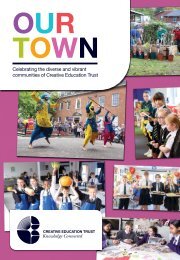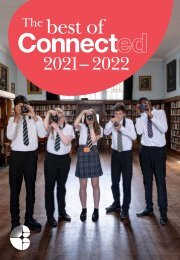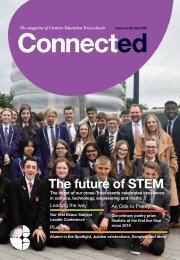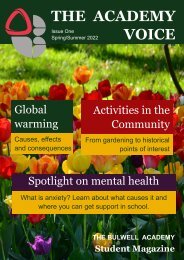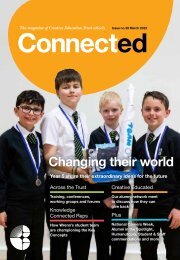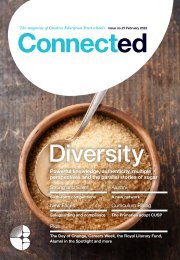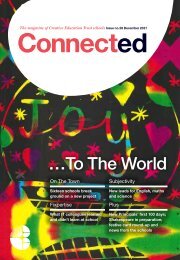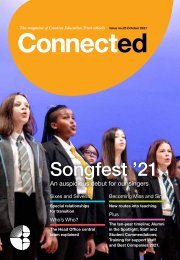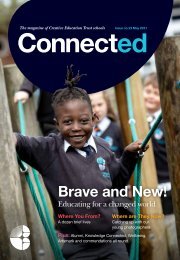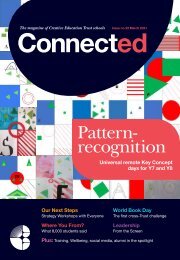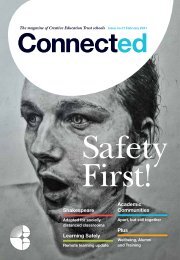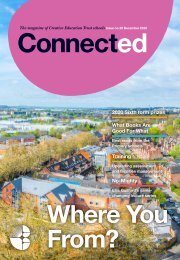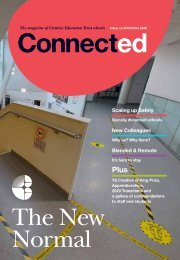Connected issue 24
The 24th issue of Connected: the magazine of Creative Education Trust schools
The 24th issue of Connected: the magazine of Creative Education Trust schools
Create successful ePaper yourself
Turn your PDF publications into a flip-book with our unique Google optimized e-Paper software.
10<br />
<strong>Connected</strong><br />
The magazine of Creative Education Trust schools<br />
Issue no.<strong>24</strong><br />
July 2021<br />
11<br />
Local<br />
Advocates<br />
Lizzie, Margaret, Carys,<br />
Rhea, Emily and Aleghia<br />
map out Wellingborough<br />
Lexie, Lilly, Abi and<br />
Chloe map out Rugeley<br />
This summer term, three schools have had the opportunity to participate in a pilot<br />
of the Trust’s first Advocacy Challenge. Year 9 pupils of Weavers, Lynn Grove<br />
and the Hart are learning about advocacy and active citizenship by putting<br />
forward pitches in response to the question ‘What does this community need?’<br />
The project is delivered in partnership with the Kalisher Trust,<br />
a charity focused on developing young people’s advocacy<br />
skills, and in the longer term, diversifying England’s criminal<br />
bar. They passionately believe that everyone should have a<br />
voice. Sue Freestone, Director of Education at the Kalisher<br />
Trust, shares her hope that the challenge will help students<br />
develop the skills and confidence to express the views that<br />
matter to them. “Advocacy is a skill that supports success<br />
in all areas of life. When we can speak articulately on behalf<br />
of other people or to support something we believe in<br />
passionately, we are personally empowered and become<br />
a vital part of making good things happen.”<br />
“Our year 9 students have<br />
handled the topics with empathy<br />
and maturity, and the coaching<br />
has been a once in a lifetime<br />
experience for them.”<br />
Hollie Rush, English teacher at Lynn Grove<br />
The project takes place in three different stages. The first<br />
stage, in which over 500 pupils participated across the<br />
three schools, is the opportunity for students to be creative,<br />
mapping out their communities and identifying the causes<br />
that most need their attention as spokespeople. Stage<br />
two is all about research and building the evidence to<br />
drive forward their argument. They develop a written<br />
and spoken pitch answering the question ‘What<br />
does this community need?’ Next, each school is<br />
supported to identify five finalist teams, who receive<br />
coaching from a Kalisher Trust barrister on their public<br />
speaking, before delivering their pitches before an<br />
audience and a panel of judges at a final to determine<br />
the winning team.<br />
The challenge has been designed to enable students<br />
to make a genuine difference. The winning team in<br />
each school will be supported to take forward their<br />
recommendations in outputs such as a campaign,<br />
events, or a fundraising drive. The teams will also be<br />
supported to influence local leaders as advocates for<br />
Teams map out the places<br />
and groups that make up<br />
their local community. The<br />
activity encourages pupils<br />
to reflect on what might be<br />
missing, whether there are<br />
barriers preventing certain<br />
groups from accessing the<br />
different spaces, and whether<br />
any spaces could be better<br />
used or transformed.<br />
their chosen cause - two schools have secured an audience<br />
for the winning team with their MP.<br />
The challenge has provoked passionate, well-argued, and<br />
extensively researched pitches. They call for improvements in<br />
a range of areas, including in mental health, homelessness,<br />
the PHSE curriculum, women’s safety, public transport, the<br />
environment, and opportunities for young people.<br />
In addition to identifying root causes of these problems,<br />
students have thought creatively about solutions that could<br />
make positive change. As Sue Freestone says, “All communities<br />
needs spokespeople. Whilst many hold strong views and are<br />
happy to grumble in the background, it is those who are able<br />
to express their concerns in a persuasive and convincing way<br />
who become the engines of change to the benefit of those<br />
communities.”<br />
The Sustainable Development Goals, agreed by world leaders in<br />
2015 to tackle the global <strong>issue</strong>s today, are a helpful framework for<br />
prompting teams to consider ‘What does this community need?’<br />
Lyla, Isla, Alex and Joe<br />
map out Great Yarmouth<br />
Our<br />
Town<br />
Community<br />
Fund<br />
As Creative Education Trust school<br />
communities re-open after the disruption<br />
of the global pandemic, the Board is<br />
distributing funds to support studentled<br />
social action in the community<br />
during 2022. This project expresses<br />
the Trust’s strategic aim for our schools<br />
and their pupils to be active and valued<br />
participants in their localities, and<br />
responds to school leaders’ request for<br />
a cross-Trust community initiative. Bids<br />
to the fund are invited from all primary<br />
and secondary schools to support<br />
projects that promise to address the<br />
objectives of Learning, Creative Skills,<br />
Impact, Employability, Inclusiveness<br />
and Sustainability.<br />
Contact Emily Campbell,<br />
Director of Programmes, for the brief<br />
emily.campbell@creativeeducationtrust.<br />
org.uk




